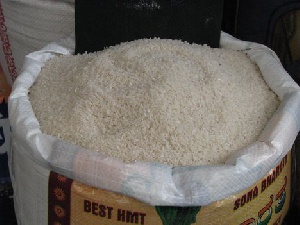Importers of rice from the frontiers of the country are cautioning government of the huge financial and economic implications of the decision to ban importation of rice by land, which came into effect from 1st Novermber, 2013.
The Ministry of Trade and Industry, in a notice to importers of rice in the Monday, October 14, 2013 edition of the Daily Graphic and signed by the Sector Minister Hon. Haruna Iddrisu, directed that ‘with effect from 1st Novermber, 2013, all imports of rice shall be done through only the Kotoka International Airport, Tema and Takoradi Ports.’
The directive among other things warned that ‘importation of rice through all land frontiers shall be illegal,’ and ‘any person who imports rice through any port other than the declared Ports commits an offence and shall be prosecuted, and in addition have such imports confiscated.’
This policy, as stated in the publication, ‘is intended to provide a framework of administrative procedures through which the numerous unfair trade practices including evasion of import duties and other taxes, under-invoicing, infringement of trademarks, and smuggling shall be controlled’.
It is against this backdrop that members of the Ghana-Ivory Coast Rice Importers and Sellers Association have asked government to reconsider and subsequently withdraw the ban in view of the eminent and indefinable consequences that consumers, importers and the country as a whole could face if the policy is allowed to come into effect.
They lamented that several Ghanaians involved in the rice importation business by land, particularly the small- to medium-scale dealers and those involved in the carting of the commodity and a chunk of others in the retail trade, risk losing their source of livelihood.
This development, according to the importers, would thus more likely lead to huge losses of revenue to the state -- given that colossal sums of monies are paid as import duties at the borders of the country whenever they bring in rice.
The intended ban, if not immediately reversed, they reckoned, would rather also position the foreigners in the rice importation business to monopolise the trade, considering how uncompetitive the rice market would become and the huge capital that would be required to import through the declared Ports.
They therefore appealed for government to take a second look at the ban, and also take a cue from the outcome of similar policies introduced on tinned tomatoes, textiles and others some time past.
The government has also been advised to work effectively to immediately replace Customs officials at the various entry points if they cannot be trusted to check smuggling activities and tax evaders -- among the several reasons why it offered support for the introduction of this new policy.
Business News of Monday, 4 November 2013
Source: B&FT













